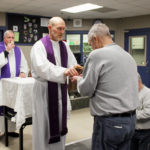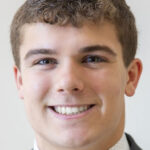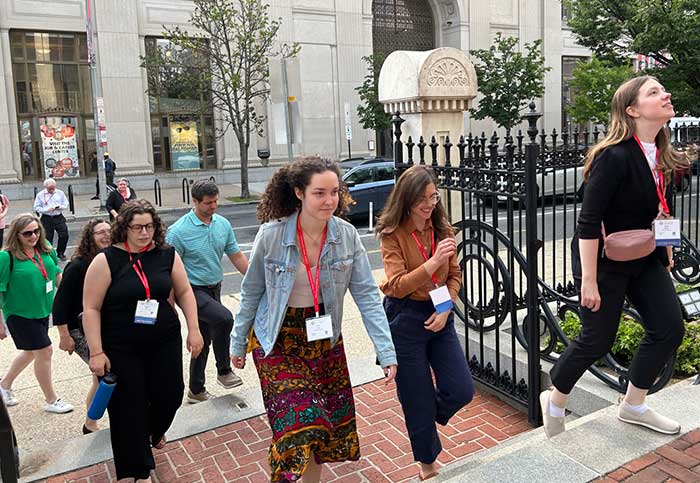
Young adult Catholics walk up the stairs to the Basilica of the National Shrine of the Assumption of the Blessed Virgin Mary in Baltimore June 9.
By Barb Arland-Fye
The Catholic Messenger
During a presentation of the Catholic Media Conference in Baltimore last week, two panelists shared insights they have gained about young adult Catholics, ages 18-35. For instance, a 2020 study of young adult Catholics found that they are more likely to be involved in faith groups outside of attending Mass or their parish life than what is acknowledged publicly.
Father Thomas Gaunt, S.J., executive director of CARA (Center for Applied Research in the Apostolate) said that insight was among the conclusions of the study CARA conducted. Young adult Catholics’ participation in these groups “appears to be grounded in a desire to live out their faith in daily life and the fact that these participants are generally more socially active than non-participants,” the study found. Furthermore, “a significant segment of young adult Catholics are interested in and already regularly participating in Bible study and social prayer — often outside parish context.”
Paulist Father Dave Dwyer, executive director of Busted Halo who hosts “The Busted Halo Show” (a radio talk show on SiriusXM), told the Catholic media professionals that reaching out to young adult Catholics requires three essential elements:
- Be more authentic. They want to be able to relate to somebody, and they want tough topics to be addressed and not breezed over.
- Be more responsive. They want to be listened to and heard and they want answers to their questions, even if the listener does not have a good answer to the question.
- Be more funny! This engages people’s lighter side.
In response, to the conference speakers’ insights, The Catholic Messenger asked two priests of the Diocese of Davenport who minister to young adult Catholics to share their own insights. Father
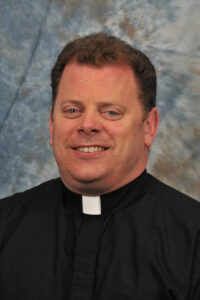
Jeff Belger, priest director of the Newman Catholic Student Center in Iowa City, and Father Ross Epping, chaplain of St. Ambrose University in Davenport and pastor of St. Peter Parish in Buffalo, emphasized relationship building, particularly between young adult Catholics and their peers.
Small groups work
Father Belger shared a story about a University of Iowa student exclaiming his surprise and delight when his roommate agreed to join him for a Bible study at the Newman Center on campus. “We’re encouraging the students who come to us already committed to their faith and teaching them to share it with their peers who don’t know what they want,” Father Belger said. The Newman Center’s FOCUS missionaries (trained evangelizers, usually recent graduates of other colleges) help foster discipleship.
The Newman Center invites students to small group Bible studies, retreats, service projects, faith formation and community building activities. “Small group Bible study, that’s where we’re seeing the growth,” Father Belger said. He also is seeing more students at Mass, as a result. In addition, “we go to the cafeteria, sit at the tables and start up conversations.” He and other members of the Newman Center don’t start out preaching about God. “We have to earn the right to be heard, which means listening.”
Father Epping said he isn’t surprised by the CARA study’s findings regarding small group participation. “People are so lonely (a feeling exacerbated by the pandemic and ‘silo-ism’). Also not surprising: fewer young adult Catholics are showing up for Mass. His concern, and the concern of the St. Ambrose University, is fostering a sense of community that students can embrace. “We can’t come to know God if we don’t know each other,” Father Epping said. “Our experiences with other people predicates our relationship with Christ.”
The face of God
In one-on-one conversations with students, he hears students longing for a best friend. “Students need an opportunity to form friendships,” he said, which is why Campus Ministry works closely
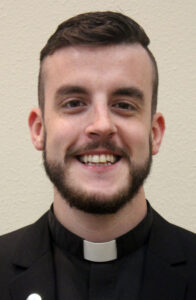
with coaches and others to provide service opportunities in the greater community. The students are “not just seeing each other on the field but fostering relationships in the context of serving other human beings.”
Campus ministry is looking to develop more intentional approaches to building relationships, more robust retreat experiences — through campus ministry and outside of campus ministry, he said. The university also has peer campus ministers in each dorm because students “need friends who are their peers.” These trained peer ministers “can be the face of love and God.”
Father Epping attends sports activities and other events on campus as well. “I need to be visible so students can get to know me outside the chapel, which helps us to build a more approachable way of ministry … building relationships with one another and with God. It’s a lot easier if they know who I am and that I care about them.”
He thinks the Catholic Church has been very slow in understanding what has happened to everybody — polarization, social media that creates silos, the effect of the pandemic — but particularly the generation that is leaving the Church.
“We have to be the presence of the eucharistic Lord in the world. I need to be, you need to be, that presence of God in the world, to make others feel embraced and loved and encouraged,” Father Epping said.
When he asks students to recall their first experience at the Newman Center, they often mention the name of the person who welcomed them and an event in which they participated. “And who did you do that for?” Father Belger asks them.









